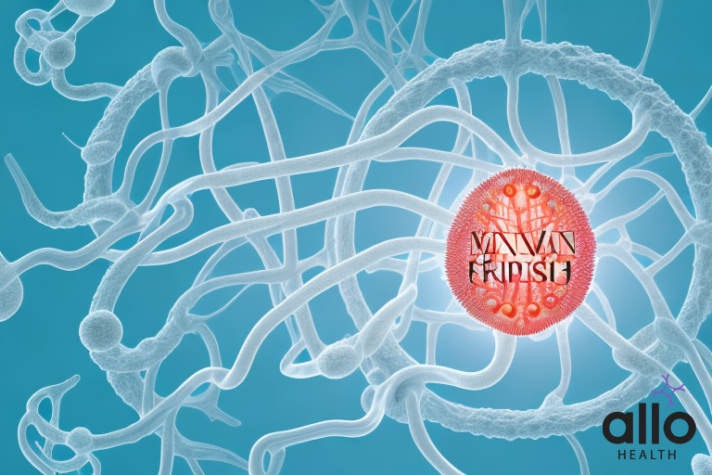Is It Unhealthy To Not Ejaculate?

Allo Health is dedicated to personalized well-being, offering support and trusted information tailored to individual health goals. The platform emphasizes human-generated content, led by a distinguished medical team of experts, including physicians and sexual health specialists. Their commitment to credibility involves rigorous fact-checking, authoritative research, and continuous updates to ensure accurate, up-to-date information. Allo Health's unique approach goes beyond conventional platforms, providing expert-led insights and a continuous commitment to excellence, with user feedback playing a crucial role in shaping the platform's authoritative voice.

Dr. Ajay Ravi holds an MBBS degree from JSS Medical College, Mysore. He has worked closely with the psychiatry department at JSS and has gained experience in the field of Sexual health and medicine.
Why This Was Upated?
Our experts continually monitor the health and wellness space, and we update our articles when new information became available.
Updated on 30 May, 2024
- Article was updated as part of our commitment to diversity, equity, and inclusion.

"The following blog article provides general information and insights on various topics. However, it is important to note that the information presented is not intended as professional advice in any specific field or area. The content of this blog is for general educational and informational purposes only.
Book consultation
The content should not be interpreted as endorsement, recommendation, or guarantee of any product, service, or information mentioned. Readers are solely responsible for the decisions and actions they take based on the information provided in this blog. It is essential to exercise individual judgment, critical thinking, and personal responsibility when applying or implementing any information or suggestions discussed in the blog."
When it comes to male sexual health, one topic that is often overlooked is ejaculation. Many men may not be aware of the potential health risks that can arise from not ejaculating regularly. In this article, we will explore the science of ejaculation, the benefits of this sexual act, and the possible risks and misconceptions associated with not ejaculating. We will also discuss different techniques for improving sexual wellness and ways to seek medical help when needed.
What Is Ejaculation?
Ejaculation is the process by which semen is forcefully expelled from the penis, usually accompanied by orgasm. It is a physiological and sexual response that occurs in males during sexual activity or as a result of sexual stimulation. Here are the key aspects of ejaculation in detail:
- Physiological Process:
- Arousal: Sexual arousal triggers a series of physiological responses in the body, including increased blood flow to the genital area.
- Erection: Increased blood flow to the penis leads to an erection, which is necessary for ejaculation.
- Stimulation: Sexual stimulation, whether through physical touch or mental arousal, activates the sexual response system.
- Role of the Reproductive System:
- Seminal Vesicles and Prostate Gland: Seminal vesicles and the prostate gland produce seminal fluid, which constitutes the majority of semen. This fluid nourishes and transports sperm.
- Sperm Production: Testicles produce sperm, which is mixed with seminal fluid to form semen.
- Ejaculatory Reflex:
- Ejaculatory Pathway: The ejaculatory reflex involves the coordinated contraction of various muscles, including those in the pelvic region.
- Sperm Movement: Sperm travel from the testicles through the vas deferens and mix with seminal fluid in the ejaculatory ducts.
- Orgasm:
- Sensations: Orgasm is a pleasurable and intense sensation that accompanies ejaculation.
- Release of Tension: The climax of sexual arousal triggers the release of accumulated sexual tension through rhythmic contractions of pelvic muscles.
- Stages of Ejaculation:
- Emission: The first stage involves the movement of sperm and seminal fluid into the urethra.
- Expulsion: The second stage is the forceful expulsion of semen from the penis.
- Refractory Period:
- Recovery: After ejaculation, males typically experience a refractory period during which they are temporarily unable to achieve another erection or experience another orgasm.
- Factors Affecting Ejaculation:
- Psychological Factors: Emotional and psychological factors, such as stress or anxiety, can influence the timing and intensity of ejaculation.
- Medical Conditions: Certain medical conditions or medications may impact the ejaculatory process.
It’s important to note that while ejaculation is a natural and normal part of the male reproductive system, individual experiences and responses can vary. If someone has concerns or questions about their sexual health, it’s advisable to consult with a healthcare professional or a qualified medical professional for personalized advice and guidance.

Is Ejaculation healthy?
Ejaculation, in itself, is a normal and healthy physiological process for males. It plays a crucial role in reproduction by facilitating the release of sperm, which can fertilize an egg during sexual intercourse. Additionally, ejaculation is associated with sexual pleasure and can contribute to overall sexual well-being. Here are some details about the health aspects of ejaculation:
- Reproductive Health:
- Fertility: Ejaculation is essential for reproduction, as it delivers sperm from the male reproductive system into the female reproductive tract, increasing the chances of fertilization.
- Prostate Health:
- Prostate Function: Regular ejaculation may have potential benefits for prostate health. It is believed that ejaculation helps flush out potentially harmful substances and may contribute to maintaining a healthier prostate.
- Sexual Function:
- Erectile Function: Ejaculation is often associated with sexual arousal and orgasm, contributing to overall sexual satisfaction and well-being.
- Psychological Well-being: Sexual activity, including ejaculation, can have positive effects on mental health, reducing stress and promoting a sense of connection and intimacy in relationships.
- Hormonal Regulation:
- Hormone Release: During sexual arousal and ejaculation, the body releases various hormones, including oxytocin and endorphins, which contribute to feelings of pleasure, bonding, and relaxation.
- Cardiovascular Health:
- Physical Activity: Sexual activity, including the physical exertion associated with ejaculation, can be a form of moderate exercise, which may have cardiovascular benefits.
- Immune System Support:
- Immune Response: Some studies suggest that sexual activity, including ejaculation, may have a positive impact on the immune system. However, the relationship between sexual activity and immune function is complex and not fully understood.
- Mental Health:
- Stress Reduction: Sexual activity, including ejaculation, can promote relaxation and reduce stress, which can have positive effects on mental health.
It’s important to note that while ejaculation is generally considered a healthy and natural part of male sexual function, individual experiences and health conditions can vary. Some factors, such as the frequency of ejaculation, may be subjective and dependent on individual preferences and circumstances.
If someone has concerns about their sexual health, reproductive function, or overall well-being, it is advisable to consult with a healthcare professional. They can provide personalized advice, address specific concerns, and offer guidance based on an individual’s health history and circumstances.
Is It Unhealthy To Not Ejaculate?
Not ejaculating, also known as sexual abstinence or avoiding ejaculation for an extended period, is generally considered safe and not inherently unhealthy for most men. In fact, some individuals choose to abstain from ejaculation for personal, cultural, or religious reasons. However, it’s essential to understand the potential effects and consider individual circumstances. Here are some details regarding the impact of not ejaculating:
- Reproductive Health:
- Sperm Retention: Not ejaculating for a prolonged period may lead to an accumulation of sperm in the testicles. While the body typically reabsorbs unused sperm, long-term abstinence could potentially affect sperm quality or mobility. However, more research is needed to fully understand the implications.
- Prostate Health:
- Prostate Function: Regular ejaculation is thought to have potential benefits for prostate health, as it may help flush out substances that could accumulate in the prostate. Some studies suggest that infrequent ejaculation may be associated with a slightly higher risk of prostate concerns, though more research is needed.
- Psychological and Emotional Factors:
- Libido and Sexual Function: Not ejaculating does not necessarily lead to negative effects on libido or sexual function. However, individual responses can vary, and some individuals may experience changes in sexual desire or function.
- Mental and Emotional Well-being:
- Stress Relief: Ejaculation is often associated with the release of hormones like oxytocin and endorphins, contributing to feelings of pleasure and stress relief. While sexual abstinence does not necessarily lead to mental health concerns, regular sexual activity can have positive effects on mood and well-being.
- Individual Preferences and Values:
- Cultural and Personal Beliefs: Some individuals choose to abstain from sexual activity or ejaculation due to personal, cultural, or religious beliefs. For these individuals, sexual abstinence is a personal choice and may align with their values.
- Frequency and Moderation:
- Balance is Key: Like many aspects of health, balance is crucial. For most individuals, a moderate and balanced approach to sexual activity is considered healthy. Extreme behaviors, whether excessive or prolonged abstinence, may potentially have different health implications.
It’s important to note that research in this area is ongoing, and individual responses to sexual abstinence can vary. If someone has concerns about their sexual health, reproductive function, or overall well-being, it is advisable to consult with a healthcare professional. They can provide personalized advice, address specific concerns, and offer guidance based on an individual’s health history and circumstances.
Reasons To Not Want To Ejaculate
People may have various reasons for not wanting to ejaculate, and these reasons can be influenced by personal, cultural, medical, or psychological factors. It’s important to note that individual preferences and choices regarding ejaculation can vary. Here are several reasons why someone might choose not to ejaculate:
- Cultural or Religious Beliefs: Some individuals adhere to cultural or religious values that emphasize the importance of sexual abstinence or the restriction of certain sexual behaviors. For these individuals, refraining from ejaculation may be a reflection of their beliefs and values.
- Personal Choice or Preference: Some people simply prefer not to ejaculate due to personal preferences or choices related to their sexual experiences. This may be influenced by individual comfort levels, preferences within a relationship, or a desire for a different sexual experience.
- Spiritual Practices: In some spiritual practices, there are beliefs that conserving sexual energy, including refraining from ejaculation, can have spiritual or energetic benefits. Practices such as Tantra, for example, involve harnessing and channeling sexual energy for personal and spiritual development.
- Medical Conditions: Certain medical conditions or medications may affect sexual function or desire. Individuals experiencing specific health concerns or taking medications with sexual side effects might choose to abstain from ejaculation for medical reasons.
- Relationship Dynamics: In some cases, individuals may choose not to ejaculate based on communication and agreements within their relationships. This could be part of a shared decision or understanding between partners for various reasons, including emotional or physical considerations.
- Personal Goals and Discipline: Some individuals may set personal goals related to sexual discipline or self-control. Abstaining from ejaculation could be a choice made to align with broader goals, whether they are personal development, mindfulness, or discipline-related objectives.
- Psychological Factors: Psychological factors, such as stress, anxiety, or trauma, can influence one’s attitude towards ejaculation. Some individuals might choose to abstain from ejaculation during periods of increased stress or emotional challenges.
- Exploration of Tantra or Taoist Practices: Practices like Tantra and Taoism involve specific techniques for managing sexual energy, and not ejaculating is a part of these practices. Some individuals explore these traditions for personal growth, spiritual development, or enhanced intimacy.
It’s crucial to emphasize that these reasons are diverse and subjective. What matters most is that individuals make informed decisions about their sexual health and well-being based on their unique circumstances and values. If someone has concerns or questions about their sexual health, it’s advisable to consult with a healthcare professional for guidance tailored to their specific situation.
Most Asked Questions
-
Are there mental health implications associated with not ejaculating?
While sexual abstinence does not necessarily lead to mental health concerns, ejaculation is associated with the release of hormones that contribute to pleasure and stress relief. Regular sexual activity can positively impact mood and well-being.
-
What is the role of individual preferences in deciding whether to abstain from ejaculation? Some individuals choose to abstain from sexual activity or ejaculation due to personal, cultural, or religious beliefs. Sexual abstinence, in these cases, is a personal choice aligned with individual values. It's important to recognize and respect diverse perspectives on this matter.
Some individuals choose to abstain from sexual activity or ejaculation due to personal, cultural, or religious beliefs. Sexual abstinence, in these cases, is a personal choice aligned with individual values. It's important to recognize and respect diverse perspectives on this matter.
-
Can abstaining from ejaculation lead to changes in libido or sexual function?
Not ejaculating does not necessarily lead to negative effects on libido or sexual function. However, individual responses can vary, and some may experience changes in sexual desire. It's essential to consider personal preferences and values when evaluating sexual abstinence.
-
Is it unhealthy to abstain from ejaculation for an extended period?
Abstaining from ejaculation for an extended period is generally considered safe for most men. While the body may reabsorb unused sperm, long-term abstinence could potentially impact sperm quality. However, research in this area is ongoing, and individual responses vary.







































